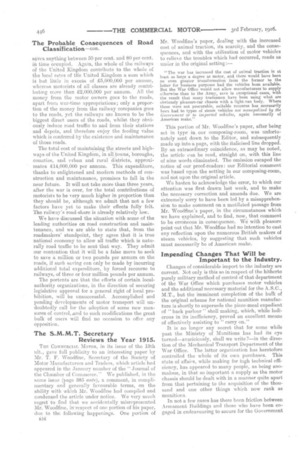The Probable Consequences of Road Classification—con.
Page 2

If you've noticed an error in this article please click here to report it so we can fix it.
saves anything between 50 per cent. and 80 per cent. in time occupied. Again, the whole of the railways of the United Kingdom contribute to the whole of the local rates of tile United Kingdom a sum which is but little in exces of £5,000,000 per annum, whereas motorists of all classes are already contributing more than £2,000,000 per annum. All the money from the motor owners goes to the roads, apart from war-time appropriations; only a proportion of the money from the railway companies goes to the roads, yet the railways are known to be the biggest direct users of the roads, whilst they obviously induce road traffic to and from their stations and depots, and therefore enjoy the feeding Value which is conferred by the existence and Maintenance of those roads.
The total cost of maintaining thee streets and highways of the United Kingdom, in all towns, boroughs, counties, and urban and rural districts, approximates £14,000,000 per annum. This expenditure,. thanks to enlightened and modern methods of construction and maintenance, promises to fall in the near future. It will not take more than three years, after the war is over, for the total contributions of motorists to be very much higher in proportion than they should be, although we admit that not a few factors have yet to make their effects fully felt. The railway's road-share is already relatively low.
We have discussed the situation with some of the leading authorities on road construction and main-• tenance, and we are able to state that, from the roadmakers' standpoint, they agree that it is true national economy to allow all traffic which is naturally road traffic to be sent that way. They admit our contention that it will be a false move to seek to save a million or two pounds per annum on the roads, if such saving can only be made by incurring additional total expenditure, by forced recourse to railways, of three or four million pounds per annum. The portents are that the efforts of certain localauthority organizations, in the direction of securing legislative approval for a general right of local prohibition, will be unsuccessful. Accomplished and pending developments of motor transport will undoubtedly call for the adoption of some new measures of control, land to such modifications the great bulk of users will find no occasion to offer any opposition.






















